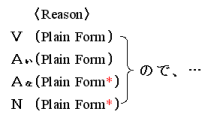Il significato di ので è uguale a quello di それで (lezione 17-9-1), ma a differenza di それで, che è posto all'inizio della frase, ので si usa all'interno di una frase.
* Gli aggettivi in-na e i nomi alla forma non passata affermativa perdono il だ alla fine della forma piana e aggiungono な prima di ので.

![]() 兄は びょうきに なったので、学校を 休みました。
兄は びょうきに なったので、学校を 休みました。
Poiché mio fratello maggiore si è ammalato, non è andato a scuola.

![]() この テープは だいぶ 古いので、いい 音が しません。
この テープは だいぶ 古いので、いい 音が しません。
Poiché questa cassetta è molto vecchia, non ha un buon suono.

![]() 図書室は しずかなので、よく べんきょうが できます。
図書室は しずかなので、よく べんきょうが できます。
Poiché l'aula studio è silenziosa, si può studiare bene.
Lezione 10-7「よく わかりませんから、もういちど 先生に ききましょう。」
Dato che non ho capito bene, lo chiederò di nuovo al professore.
|
【~ので、それで】【~から、だから】
ので and それで are often followed by a fact or a phenomenon consequent to a
preceding event. They are rarely used with sentences which has the following endings: ×~でしょう (conjecture ; probably~) ×~ましょう (proposal, suggestion ; Lets'~) ×~なさい(imperative ; e.g., Do it.) ×~てください(request ; Please~) etc. On the other hand, から and だから are often used with the above sentence endings. |

